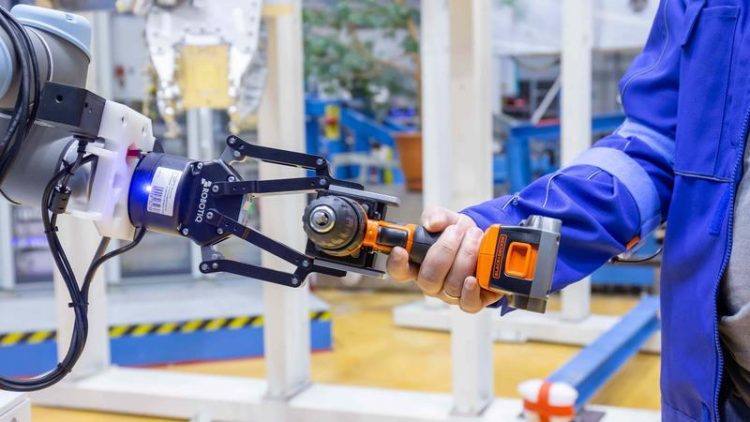Riveting,Screwing, Gluing in Aircraft Construction: Smart Human-Robot Teams Master Agile Production

In the future, machines will perform manufacturing tasks that strain human capabilities. Quelle: DFKI
In mixed teams, the robots “organize around the humans,” achieving the freedoMam and flexibility to complete their production schedule. Humans perform tasks that require higher cognition or sensory motor skills, such as fine adjustments and quality controls. Support is provided by means of an AR application and HoloLens glasses.
The demonstrator is based on a controllable service-based infrastructure for INDUSTRIE 4.0 production systems, supplemented and enhanced by a resource-oriented architecture (ROA). The ROA enables the deployment of distributed components and sensors and access to them. Existing and new elements can be integrated with the ROA using Web standards.
Via the ROA, the integrated components supply information, such as conditions and sensor data (as “providers”), while they can also retrieve information from other components (as “consumers”).
Subsequently, mobile and stationary robotics, sensor systems, environment detection, and tracking systems can be linked together, and new services based on them can provide new capabilities (as “prosumers”).
Semantically enriched, existing systems can also be encapsulated and approached in a homogeneous way, which ensures fast interchangeability. Such decentral deployment allows the local transfer of information without going through a central control unit.
For example, the worker can be informed at all times about a status change of the workpiece or workflow, and sensor information from different sources can also be bundled and provided. The ROA supports a dynamic and adaptable implementation of human-robot collaboration (HRC).
Hybr-iT is also researching and developing methods in 3D simulations from HRC scenarios. These methods provide a virtual safeguard for planned workflows and ensure a seamless transition from planning to initial operations. In addition, the processes are also modeled, and the interplay between worker and robot actions are checked in advance for practical feasibility.
Press-Contact
Heike Leonhard
Corporate Communications DFKI Saarbrücken
e-mail: Heike.Leonhard@dfki.de
phone.: +49 681 85775 5390
mobile: +49 174 3076888
Dr. Anselm Blocher
Research Department Cognitive Assistants
e-mail: Anselm.Blocher@dfki.de
phone: +49 681 85775 5262
Media Contact
All latest news from the category: Trade Fair News
Newest articles

A universal framework for spatial biology
SpatialData is a freely accessible tool to unify and integrate data from different omics technologies accounting for spatial information, which can provide holistic insights into health and disease. Biological processes…

How complex biological processes arise
A $20 million grant from the U.S. National Science Foundation (NSF) will support the establishment and operation of the National Synthesis Center for Emergence in the Molecular and Cellular Sciences (NCEMS) at…

Airborne single-photon lidar system achieves high-resolution 3D imaging
Compact, low-power system opens doors for photon-efficient drone and satellite-based environmental monitoring and mapping. Researchers have developed a compact and lightweight single-photon airborne lidar system that can acquire high-resolution 3D…





















